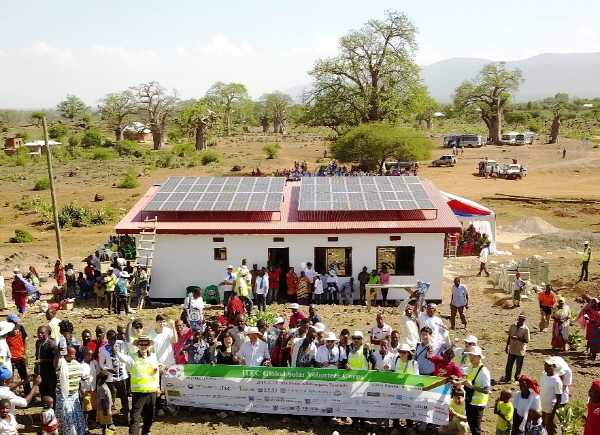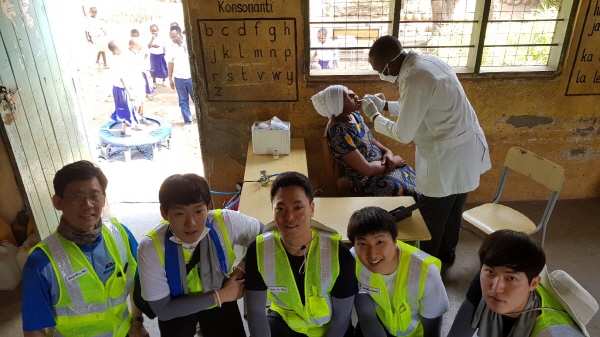Department News
Seoul National University’s iTEC & Solar Volunteer Corps Build Smart Solar Photovoltaic Power Plant in Tanzania
Seoul National University’s iTEC & Solar Volunteer Corps
Build Smart Solar Photovoltaic Power Plant in Tanzania<?xml:namespace prefix = "o" ns = "urn:schemas-microsoft-com:office:office" />
<?xml:namespace prefix = "v" ns = "urn:schemas-microsoft-com:vml" />
▲ Opening ceremony of the Smart Solar Photovoltaic Power Plant in Tanzania (Photo by SNU College of Engineering)
On February 2, Seoul National University’s College of Engineering (Dean: Kookheon Char) announced that Korea-Tanzania Science and Technology Center (iTEC) has built a 10-kilowatt (kW) solar photovoltaic power plant in Mkalama, located in the Kilimanjaro Region of Tanzania.
The village of Mkalama is considered to be a backcountry area, located near the Equator at 3.4 degrees southern latitude and 800 meters above sea level. Due to its remote location, none of the country’s electrical grids can cover the village, leaving its residents with no access to electricity—a situation typical of the African countryside where 90% of the population live.
Solar panels constructed on the roof of the power plant provide electricity and lighting to over 50 houses. The residents, many of whom are Maasai, are able to carry on with crop processing using the electricity provided by the power plant, through which they may increase revenue and establish small business ventures.
Additionally, in order to implement prepaid electricity metering common in Africa, they are utilizing the Smart Meter developed by Seoul National University, as well as remote monitoring and control system.
Construction of the power plant and utility poles, lighting, and internal wiring of houses were carried out by iTEC, Mkalama residents, and Solar Volunteer Corps consisting of over 50 people who were professors and students from Seoul National University, Hanyang University, Konkuk University, Gyeongsang National University, Woosong University, Korea University of Technology and Education, Georgia Institute of Technology, University of Chicago, and the Nelson Mandela African Institution of Science and Technology (NM-AIST), along with entrepreneurs and nonprofit organizations including E3 Empower.
Solar Volunteer Corps taught science to over 900 local elementary school students as well as working together with doctors, receiving around 170 patients. Notably, the dental team used a drill designed by SNU students during a Mechanical Engineering course to treat patients, effectively proving the utility of the product.
They also arranged free lectures at NM-AIST for Tanzanian students, comprised of 3D CAD and Arduino lessons from SNU’s College of Engineering, agrometeorological observation technology from SNU’s College of Agriculture and Life Sciences, and drone training from Konkuk University.
Among the attendees of the power plant opening ceremony were Geum-young Song and Anna Mghwira, Korean Ambassador to Tanzania and Regional Commissioner of Kilimanjaro respectively. Commissioner Mghwira commented that “photovoltaic and other forms of energy are critical in reviving not just the agriculture but the overall industry of the Kilimanjaro Region,” and that “we hope to receive investments in the energy sector by cooperating with Korea.”
[Figure]

▲ Solar Volunteer Corps (Photo by SNU College of Engineering)

